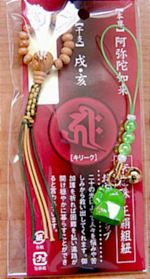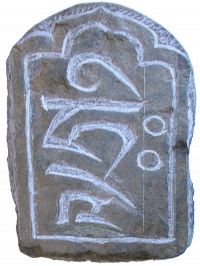Difference between revisions of "The Seed Syllable hrīḥ"
Jump to navigation
Jump to search
m (Text replacement - "]]]" to "]])") |
|||
| (3 intermediate revisions by 2 users not shown) | |||
| Line 1: | Line 1: | ||
| − | hrīḥ is the [[seed syllable]] of [[Amitābha]] and so represents the qualities of the [[Buddha]] of the [[western]] quarter: chiefly [[meditation]] and [[compassion]]. In [[Tibet]] it is also associated with [[Avalokiteśvara]] or [[Chenresig]]. | + | [[hrīḥ]] is the [[seed syllable]] of [[Amitābha]] and so represents the qualities of the [[Buddha]] of the [[western]] quarter: chiefly [[meditation]] and [[compassion]]. In [[Tibet]] it is also associated with [[Avalokiteśvara]] or [[Chenresig]]. |
| − | Read my essay on the [ | + | Read my essay on the [http://jayarava.blogspot.com/2007/07/seed-syllable-of-great-compassion.html seed syllable hrīḥ]. |
Pronounced /hriːh/ (IPA) | Pronounced /hriːh/ (IPA) | ||
| + | |||
| + | |||
| + | Other [[bījas]]: a | [[āḥ]] | [[dhīḥ]] | [[hūṃ]] | maiṃ | [[oṃ]] | tāṃ | traṃ | phaṭ | [[svāhā]] | | ||
==Examples== | ==Examples== | ||
{| | {| | ||
|- | |- | ||
| − | |[[File:Hrih.png|thumb|250px|hrīḥ <br/>[[Siddham]] | + | |[[File:Hrih.png|thumb|250px|hrīḥ <br/>[[Siddham]])] |
|<big><big><big><big><big><big>[[ह्रीः]]</big></big></big></big></big></big> <br/> <br/>hrīḥ<br/>[[Devanāgarī]] | |<big><big><big><big><big><big>[[ह्रीः]]</big></big></big></big></big></big> <br/> <br/>hrīḥ<br/>[[Devanāgarī]] | ||
|[[File:Hrih-tibetan.gif|thumb|250px|hrīḥ<br/>[[Tibetan]], [[Uchen]].]] | |[[File:Hrih-tibetan.gif|thumb|250px|hrīḥ<br/>[[Tibetan]], [[Uchen]].]] | ||
|- | |- | ||
| − | |[[File:Hrih-lantsa.png|thumb|250px|hrīḥ<br/>[[Lantsa]] | + | |[[File:Hrih-lantsa.png|thumb|250px|hrīḥ<br/>[[Lantsa]])] |
|[[File:Hrih-lantsa2.png|thumb|250px|hrīḥ<br/>[[Lantsa]] - alternative]] | |[[File:Hrih-lantsa2.png|thumb|250px|hrīḥ<br/>[[Lantsa]] - alternative]] | ||
|[[File:Hrih-chinese.png|thumb|250px|hrīḥ<br/>Chinese immitation Seal Script]] | |[[File:Hrih-chinese.png|thumb|250px|hrīḥ<br/>Chinese immitation Seal Script]] | ||
| Line 19: | Line 22: | ||
{| | {| | ||
|- | |- | ||
| − | |[[File:Hrih-cellphone.jpg|thumb|250px|Picture of hrīḥ on a Japanese cellphone strap. Courtesy of [http://flickr.com/photos/26843515@N00/ solemn.still] ]] | + | |[[File:Hrih-cellphone.jpg|thumb|250px|Picture of hrīḥ on a [[Japanese]] cellphone strap. [[Courtesy]] of [http://flickr.com/photos/26843515@N00/ solemn.still] ]] |
|[[File:Stone_hrih2.jpg|thumb|250px|This carving of hrīḥ in the Tibetan script on a piece of stone was bought in Sikkhim by a friend for another friend.]] | |[[File:Stone_hrih2.jpg|thumb|250px|This carving of hrīḥ in the Tibetan script on a piece of stone was bought in Sikkhim by a friend for another friend.]] | ||
|} | |} | ||
| Line 28: | Line 31: | ||
[[Category:Mantras]] | [[Category:Mantras]] | ||
[[Category:Seed Syllables]] | [[Category:Seed Syllables]] | ||
| + | |||
| + | |||
| + | {{DEFAULTSORT:hrīḥ}} | ||
Latest revision as of 00:02, 5 April 2016
hrīḥ is the seed syllable of Amitābha and so represents the qualities of the Buddha of the western quarter: chiefly meditation and compassion. In Tibet it is also associated with Avalokiteśvara or Chenresig.
Read my essay on the seed syllable hrīḥ.
Pronounced /hriːh/ (IPA)
Other bījas: a | āḥ | dhīḥ | hūṃ | maiṃ | oṃ | tāṃ | traṃ | phaṭ | svāhā |
Examples
| [[File:Hrih.png|thumb|250px|hrīḥ Siddham)] |
ह्रीः hrīḥ Devanāgarī |
[[File:Hrih-tibetan.gif|thumb|250px|hrīḥ Tibetan, Uchen.]] |
| [[File:Hrih-lantsa.png|thumb|250px|hrīḥ Lantsa)] |
[[File:Hrih-lantsa2.png|thumb|250px|hrīḥ Lantsa - alternative]] |
Source


